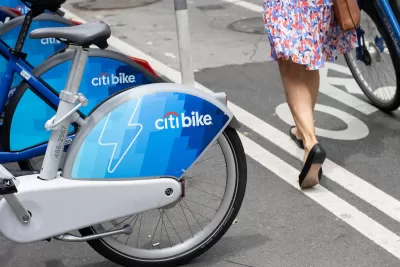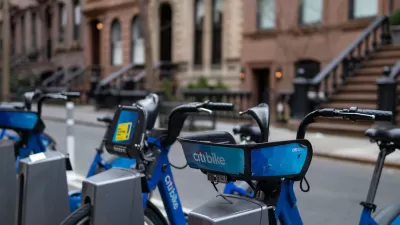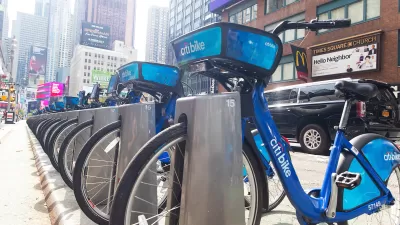How a crew of hundreds maintains one of the world’s largest bike share systems.

Writing in Curbed, John Surico highlights the more than 1,000 Citi Bike employees who keep the system running and e-bikes charged as the summer peak season kicks off.
“In June alone, the average is 165,000 rides a day, and the teams at Citi Bike and Lyft, which owns the bike-share system, believe it will hit 200,000 before the year is out.” The company attributes this success in part to its new fleet of 15,000 e-bikes, which make up 65 percent of trips in the system.
For now, charging the batteries requires taking dead batteries to a Long Island City warehouse, then returning them to the bikes. Soon, Lyft plans to install electrified charging docks to reduce the need for bringing batteries back to the warehouse. According to Surico, “The company has projected that doing so at just 20 percent of its stations would replace 90 percent of swaps.”
FULL STORY: The Citi Bike Battery Crew Racing to Keep 15,000 Bikes Online

Study: Maui’s Plan to Convert Vacation Rentals to Long-Term Housing Could Cause Nearly $1 Billion Economic Loss
The plan would reduce visitor accommodation by 25% resulting in 1,900 jobs lost.

Alabama: Trump Terminates Settlements for Black Communities Harmed By Raw Sewage
Trump deemed the landmark civil rights agreement “illegal DEI and environmental justice policy.”

Why Should We Subsidize Public Transportation?
Many public transit agencies face financial stress due to rising costs, declining fare revenue, and declining subsidies. Transit advocates must provide a strong business case for increasing public transit funding.

Paris Bike Boom Leads to Steep Drop in Air Pollution
The French city’s air quality has improved dramatically in the past 20 years, coinciding with a growth in cycling.

Why Housing Costs More to Build in California Than in Texas
Hard costs like labor and materials combined with ‘soft’ costs such as permitting make building in the San Francisco Bay Area almost three times as costly as in Texas cities.

San Diego County Sees a Rise in Urban Coyotes
San Diego County experiences a rise in urban coyotes, as sightings become prevalent throughout its urban neighbourhoods and surrounding areas.
Urban Design for Planners 1: Software Tools
This six-course series explores essential urban design concepts using open source software and equips planners with the tools they need to participate fully in the urban design process.
Planning for Universal Design
Learn the tools for implementing Universal Design in planning regulations.
Smith Gee Studio
Alamo Area Metropolitan Planning Organization
City of Santa Clarita
Institute for Housing and Urban Development Studies (IHS)
City of Grandview
Harvard GSD Executive Education
Toledo-Lucas County Plan Commissions
Salt Lake City
NYU Wagner Graduate School of Public Service





























